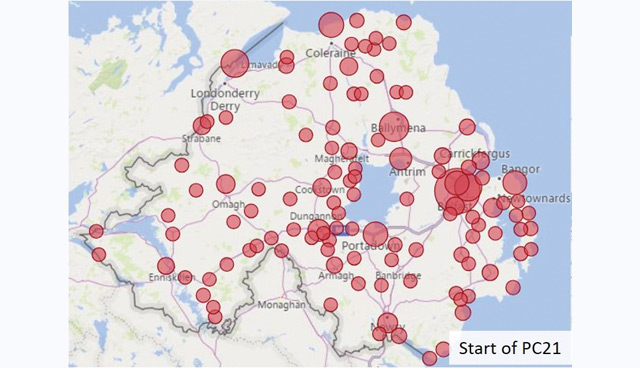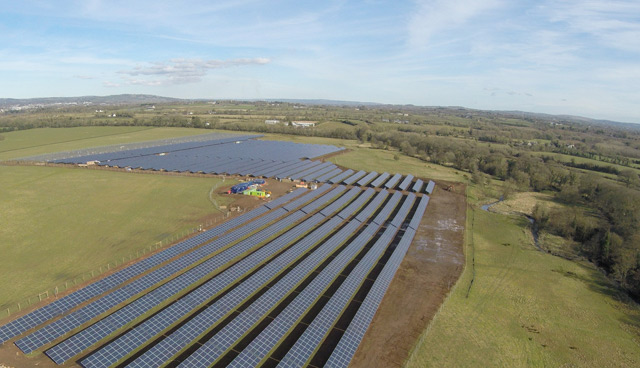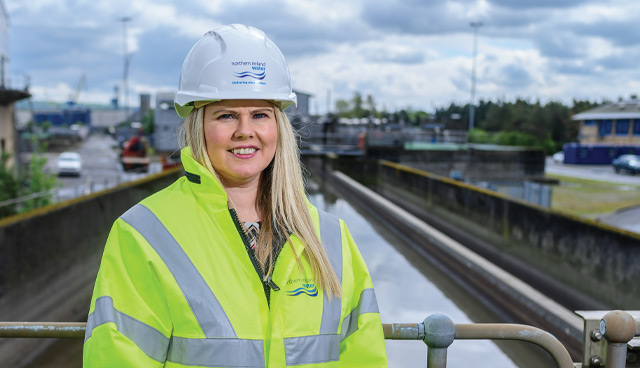Critical infrastructure: An economic priority

Chief Executive of NI Water Sara Venning talks to Owen McQuade about the investment challenge for Northern Ireland’s waste water infrastructure and her ambition to see NI Water play a central role in the region’s economic recovery.
Underscoring the importance of built-in resilience for a utility that acts as an enabler for so much of Northern Ireland’s economic and societal activity, Venning highlights NI Water’s effective handling of the impact of the unprecedented pandemic.
Like most organisations, NI Water faced almost immediate limitations to their ‘usual’ ways of working following the introduction of lockdown restrictions. However, this challenge was coupled with an increase in demand for water, as the fundamental role water plays safeguarding the health of the population was realised.
The Chief Executive explains that the organisation’s Integrated Risk and Resilience Framework, an evolving risk plan which incorporates all aspects of the business from IT infrastructure to technology availability and safety measures, ensured that 750 staff were able to make a “seamless” switch to working from home.
At the same time, those staff deemed essential to frontline operations, within treatment works, for example, were able to quickly initiate protocols that ensured a safe working environment.
“As an organisation we’re good at managing incidents and ensuring business continuity. That continuity is particularly important in the context that the risk relates to public health. So, our role in ensuring water continued to flow to hospitals, care homes and for food productions was crucial,” she says.
“At the same time, the Government’s public health advice centred on two key messages of regular hand washing and keeping hydrated, again highlighting the importance of a clean, safe and reliable water supply.”

The limitations on our wastewater capacity means that not only may homes not be built but also jobs may not be created to build these homes.
With most of the population initially housebound, and many continuing to work from home, NI Water has had to facilitate a huge shift in demand from business to home usage. The reduction in business use, Venning explains, did not weigh evenly with the spike in home use, to the point where, coupled with one of the driest springs in a century, NI Water has raised concerns around potential drought conditions going into summer.
That concern has prompted fresh impetus by NI Water to raise awareness of its crucial role in underpinning and enabling much of Northern Ireland’s economy.
“In terms of output, the results show that we are delivering our highest ever quality of drinking water and we maintained our continuity of supply throughout the challenging lockdown period. However, we’re concerned at the current levels in our reservoirs, that have dropped very quickly from being 100 per cent full at the end of winter.
“That’s why we are pushing the message about essential consumption. We have a finite amount of water we can treat and supply to homes and businesses through our Water Treatment Works and we need to ensure that it will stretch throughout what is looking to be a dry summer.”
Offering an example of the level of strain being put on the government-owned company’s largely ageing and underfunded infrastructure, Venning points out that on 29 May alone, NI Water had to increase production of treated water by 120 million litres to over 700 million litres to keep everyone supplied, an unsustainable volume for Water Treatment Works as they stand.
The challenges posed by NI Water’s funding restraints are long-standing. Systematic underinvestment was compounded by the PC15 business plan (for the period 2015-2021), which was set at an allocation of £990 million against a £1.7 billion requirement. The actual funding is likely to fall short of £900 million and added to this is an estimated £30 million reduction from business revenues this financial year.
Venning says: “NI Water will always prioritise its treated water infrastructure to ensure that every household, business, hospital and school has a reliable supply of safe, clean water, so when investment is restricted by government it’s the wastewater (sewerage by another name) infrastructure that suffers. Upgrades to 81 large Wastewater Treatment Works had to be deferred during the PC15 period, meaning that many are now operating at or close to capacity. This has resulted in curbs to economic development, particularly in relation to new connections for new housing and businesses.
“There are now 116 towns in Northern Ireland where those constraints are realities. The outworking of that is that we know of at least 35 housing development sites, including some 1,000 social homes, where developers can’t simply build and connect to the sewers. The limitations on our wastewater capacity means that not only may homes not be built but also jobs may not be created to build these homes.”
Similarly, the Chief Executive says that NI Water currently has 10 applications from large employers for increased Trade Effluent, needed for business expansion, which may have to be rejected due to insufficient capacity in their local wastewater infrastructure. Again, the impact on jobs and the economy is obvious.
Added to this are concerns around the viability of Local Development Plans being brought forward by Northern Ireland’s Local Authorities. Some 28 ‘hub’ towns have been identified in these plans as centres for economic growth, 25 of which are included in NI Water’s list of areas with little or no capacity in their wastewater systems.
“Underfunding over PC15 is part of a generational underinvestment in the sewerage infrastructure, which adds complexity and significant inefficiency to the delivery of longer term asset resilience, risks deterioration in levels of service for customers, and is leading to inadequate environmental protection through increased pollution and sewer flooding,” explains Venning.
“Unless we start properly investing in our failing wastewater infrastructure, we will have to make difficult choices about our economy and our natural environment. The scale of the problem requires a major, inescapable step change in investment.”
However, Venning also recognises vast opportunities for NI Water to be central to facilitate Northern Ireland’s economic recovery; its PC21 business plan, submitted to the Utility Regulator in January, if fully funded by government, will not only help Northern Ireland’s economy to recover post Covid but also protect our natural environment and keep our population healthy through safe, clean drinking water and the safe management of sewage and wastewater.
“Northern Ireland’s economy, like many other countries, has stalled. Across the globe we are hearing governments talk about the importance of investing in infrastructure, particularly ‘climate friendly and green infrastructure”, to stimulate economic recovery and secure economic growth. We believe the potential that investment in infrastructure offers is doubly important right now in a Northern Ireland context. Firstly, because there is an opportunity to grow our way out of a recession and secondly because right now is the time to invest in our infrastructure so that it is ready for when the economy catches up.

“The benefit is that from our perspective we have a long-term investment plan, with projects already identified and ready in the planning. Investment in infrastructure represents a major opportunity to stimulate jobs and retain a lot of highly-skilled people.
“This is a major opportunity and we are hoping that the Northern Ireland Executive, as NI Water’s shareholder, recognises that we are in a great position to pick up and deliver.”
PC21 business plan sets out that £2.5 billion, including the £1 billion Living with Water Programme for drainage in Belfast, is required. The final decision on the plan by the regulator is now expected in March 2021, following a short Covid-19 related delay.
The Northern Ireland Executive gave NI Water high profile within the New Decade, New Approach deal, stating that it will “invest urgently in wastewater infrastructure which is at or nearing capacity in many places across Northern Ireland, including in Belfast, limiting growth”.
Venning recognises that the level of investment required is a significant jump from current levels and that NI Water will face competition for a share of the block grant in challenging economic times. To this end, she hopes that NI Water has landed the point that to countenance anything less than the outlined requirement in PC21 would have significant ramifications on the wider economy.
NI Water estimates that even a £50 million reduction in PC21 funding would mean over 20 areas in towns and cities would not be able to have their much needed Wastewater Treatment Works and sewer network projects initiated, while a circa £300 million reduction would prevent necessary work in over 65 areas across the country.
Climate
While NI Water’s immediate focus continues to be on securing adequate funding to allow critical investment in its water and wastewater infrastructure, Venning says that the organisation is “determined to harness the huge and largely unseen potential for NI Water to enable climate change to be addressed”.
Emphasising the potential of NI Water to play an even greater role in Northern Ireland’s economic recovery and development, the Chief Executive believes that the utility can be a key building block in Northern Ireland’s ambition to be net zero carbon.
Highlighting its often under-stated position as Northern Ireland’s second biggest land-owner, with some 27,000 acres across over 3,000 widely distributed sites, and as Northern Ireland’s largest electricity consumer, Venning says that NI Water “is ideally placed to play a pivotal role in enabling Northern Ireland to significantly reduce harmful CO2 emissions”.
Alongside stretching goals to switch to 100 per cent renewable electricity consumption for its own operations, NI Water is already engaging with stakeholders about opening up their sites for greater investments in the likes of hydro, solar and wind generation, while also initiating the planting of one million carbon capturing trees.
Venning explains the potential benefits of utilising NI Water’s existing major electricity supply connections, if equipped with battery storage, to better align supply to demand in local distribution areas, minimising the need for network upgrades. Additionally, the requirement for NI Water to have back up energy sources at each of their sites, if converted to battery storage, could facilitate the greater capture of renewable energy generated at low demand times, thereby encouraging greater levels of renewable technology development.

However, she believes the greatest potential relates to hydrogen, describing proposals for developing a hydrogen economy as “a real game changer”. Explaining the potentially significant role NI Water could play in the decarbonisation of road transport, while at the same time creating efficiencies in their own processes, she says: “When you electrolyse water it creates oxygen and hydrogen. Oxygen is needed to treat wastewater and so great to reduce our wastewater costs, but it’s the hydrogen produced from the same electrolysis that could be a real game changer for Northern Ireland.”
Hydrogen fuel is seen as the key to ultra low emissions for large vehicles and given the location of NI Water’s wastewater sites in every major town, Venning envisages their use as green hydrogen fuel stations, facilitating a range of HGVs and LGVS from Translink through to the agriculture and haulage sectors.
NI Water is in the process of applying for funding for a pilot programme in relation to the electrolysis of water.
“Producing hydrogen is also a good fit with SONI’s ambition to see wind generation expand significantly by 2030. Flexible energy demand for electrolysis, particularly at night when there is limited alternative use for wind powered electricity, could be key in building investor confidence as hydrogen becomes more and more important,” adds Venning.
Concluding, the Chief Executive says: “There are lots of significant opportunities to harness NI Water’s assets to help address the climate emergency. All of them are very doable with joined up thinking, commitment and action from government and private sector industry, but time to address the climate emergency is short. We need get our collective heads together now.”
Venning is optimistic for the future, believing that NI Water has consistently demonstrated the importance of investment in NI Water’s infrastructure in facilitating economic improvement and the importance of their service to public health and hopes that this will be endorsed with the necessary financial backing. As society begins to contemplate what ‘normal’ may now look like, safe clean water and sanitation remain vital in the face of rising challenges such as health pandemics and climate change.





